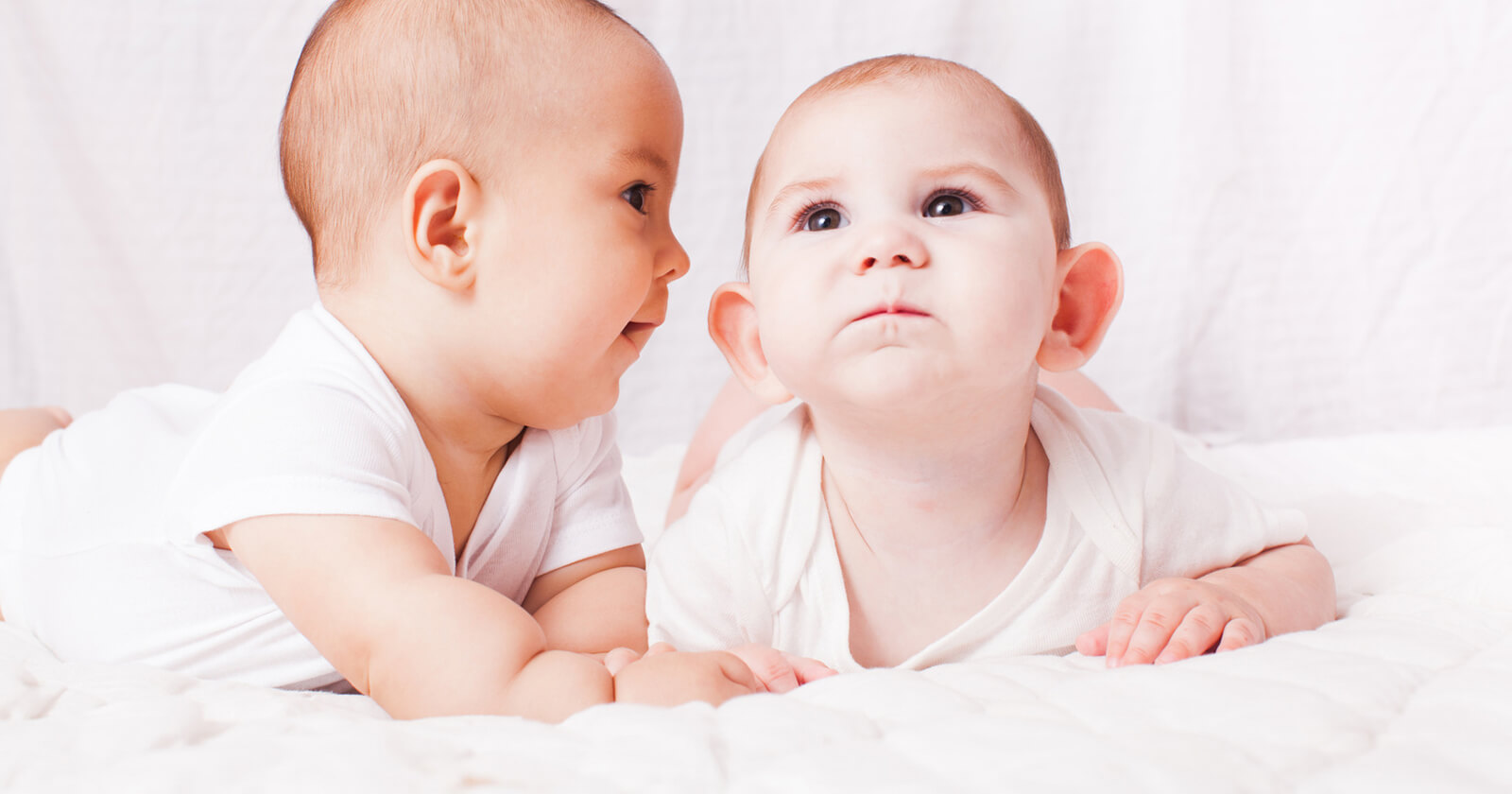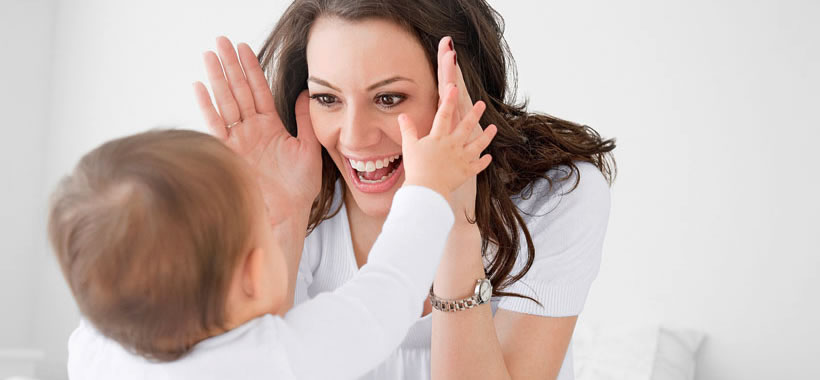In the beginning was the Word? Well, actually there was more of a juicy scream. A baby’s speech development begins the moment it is born first cry lets go and thus makes your voice heard. Previously, it was already in the womb eagerly listened to mom’s voice and familiarize yourself with speech melody, different sounds and maybe music. Baby’s good hearing is the basis for healthy language development. In the course of the first two years of life, different gurr, lall, learning and exercise phases follow, which babies gradually learn to talk about. Parents can learn their baby’s language and language development in all stages actively support and accompany.

When babies learn to speak – a creative process
Babies can communicate without words in the first weeks of their lives. They express a lot about body language and parents know it Baby signals mostly intuitive to interpret. Ideally, mums and dads are ready when babies send the following signals:
- Parents should not ignore crying, because the child is looking for closeness, is hungry and just does not want to be alone with his baby worries and needs.
- Whining and crying are also clear indications that should be followed without hesitation. Often, the louder outbursts of emotion are preceded by an announcement of displeasure.
- Even restless movements or clenched fists can express general malaise.
- A tight back or tight legs may indicate abdominal pain.
- Sucking on the fist can mean that the baby is hungry, or it can be used as a pacifier replacement to calm you down.
Baby thanks you for your attention and mindfulness from around the sixth week with one first smile – also a wonderful form of "wordless communication".
Hear well, speak well
Language development requires good hearing: out of 1,000 babies, two to three come with one hearing impairment requiring treatment to the world. If this is not discovered, it usually has a negative impact on language acquisition: only if a baby hears well can it learn to speak. In Germany, therefore, the so-called Newborn Hearing Screening carried out. Children with a hearing impairment can be helped well by modern hearing aids and early support.
Baby’s language development up to the sixth month of life
The audible speech development in the baby begins approximately after the second month of life, when it actually begins speech sounds to produce. Then completely new wonderful and come out of the baby crib creative Noises: There is a chuckle, sigh, coo and smack. And in between it gets loud. Your baby is training its voice, watching it increasingly attentively Mouth and lip movements the big one and tries to imitate them.
From the third to fourth month of life Baby already tumbles vocal-like sounds like "a!" or "i!" from the mouth when learning to speak. If the first consonants are added, it can also become a lively syllable like "da-da-da". The offspring eagerly babbles and tries to mimic noise. Your baby will be thrilled to find that it can reach you and make you give an answer, play with him, or lift him up.
Make yourself a Kasper! Open the curtain and let’s go – cut for your baby Grimaces, grimace, stick your tongue out and mouth-form O. Your baby loves these shows and will be enthusiastic about copying everything they do. You can use it to promote your baby’s healthy language development in a playful and fun way.
Do you notice anything about yourself when you talk to your baby? You would certainly not use the same speech melody at the supermarket cheese counter that you use intuitively and correctly for your baby:
- Mom and dad often talk to their offspring in a high voice.
- Words are clearly shaped and exaggeratedly emphasized.
- There are longer pauses between words and sentences.
- There are more repetitions.
- When talking to their baby, parents form shorter sentences.
Studies show that the Baby language of parents It helps babies enormously to understand the most important properties of language and to learn to speak.
I am me and learn at my own pace! Every child is unique and develops at their own pace. As with crawling and running, it is the same with baby’s language development. One child speaks its first word at ten months, the other only at 14 months. Both are completely normal in the context of a healthy overall development. By the way, the famous first word of most children is "mummy" – the "father" only managed to get first place at around 16 percent.
Baby’s language development from the sixth month of life
As is the case with people, one likes to talk a lot and the other prefers to listen. These character-typical traits also show babies. While neighbors have hours of monologues and train syllable marathons for hours, your own baby may sit comfortably chuckling on his play mat and listen world – or the other way around!
That’s how it is first words pronounced with one baby at around ten months, the other child takes some time. No need to worry – each baby’s language development is at their own pace. So no comparisons in the play group pull – better wait and drink tea! By the age of two, your child’s vocabulary will be around 200 words. Your child’s understanding of language is way ahead of active vocabulary. Parents can therefore have a lasting impact on language development by: a lively and varied vocabulary use.
Language support in kindergarten: Some children develop speech disorders in preschool age, such as Lisp, stutter or stammer. The most common issue is the sound [s] – experts speak of so-called sigmatism. Speech therapists encourage children to develop their language skills and treat language disorders. They often also work with kindergartens or carry out the treatment in their own practice.
How parents can support their baby and child’s language acquisition
Your baby’s speech development does not take place in isolation, but as part of its overall development. In order to learn to speak well, the baby also needs other positive stimuli such as exercise, play and a healthy diet. If you have one around your baby loving, happy and lively environment manage, it will develop healthily and learn to speak all by itself. Or to put it in the words of the Swiss pediatrician and author Remo Largo: "The best language support is a good relationship with the child."
RELATED ITEMS
-

Learn to speak: how babies prepare – baby and family
The toddler sees a car and speaks his first word: car. But what happened before? Experts explain how foundation stones for…
-

Learning to walk: baby’s first steps
Nicole Wendler holds a doctorate in biology from the field of oncology and immunology. As a medical editor, author and editor, she is for different people…
-
Babies and toddlers: learn, encourage, stimulate – family – society – planet knowledge
New Development Research Section – What Happens in Children. Planet knowledge. December 16, 2019. 06:01 min. Available until 16.12.2024. WDR. Babies and…
-

Learn to speak: this is how you promote language acquisition in everyday life
Leni is 8 months old and lies loudly on her baby blanket. The 2 year old Max follows you to tell you how he is with his…
